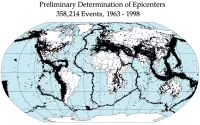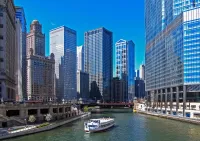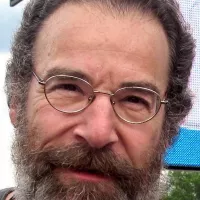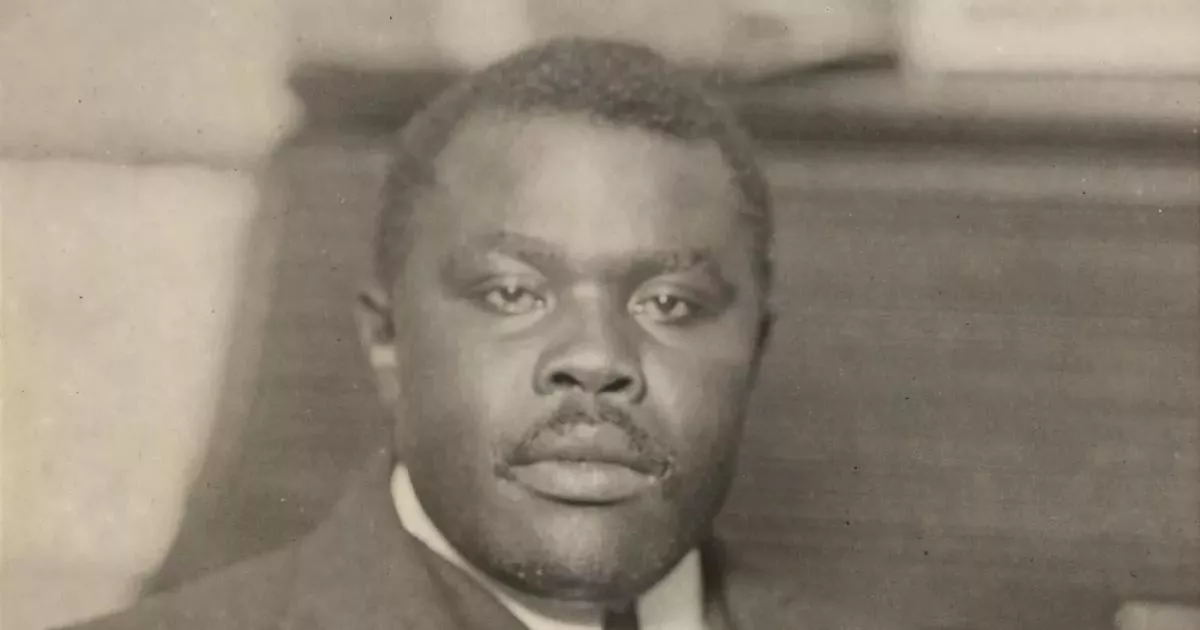Marcus Mosiah Garvey Jr., a Jamaican political activist, founded and led the Universal Negro Improvement Association and African Communities League (UNIA-ACL). He declared himself Provisional President of Africa, reflecting his black nationalist and Pan-Africanist ideology known as Garveyism. The UNIA-ACL aimed to unite people of African descent worldwide and promote black pride and self-determination. Garvey's vision included the establishment of an independent African nation governed by its own people. His activism and ideas had a significant impact on the Pan-African movement and inspired future generations of black leaders and activists.
1901: Apprenticeship as a Printer
Garvey began an apprenticeship with his godfather, a printer, in 1901.
1904: Move to Port Maria
Garvey moved to Port Maria to work at his godfather's printing business branch in 1904.
1905: Move to Kingston
Garvey moved to Kingston and worked for P.A. Benjamin Manufacturing Company in 1905.
January 1907: Kingston Earthquake
Garvey experienced the Kingston earthquake in January 1907.
March 1908: Death of Garvey's Mother
Garvey's mother died in March 1908.
November 1908: Involvement in Printer's Strike
Garvey participated in a printer workers' strike and was subsequently fired in November 1908.
April 1910: Involvement in National Club
Garvey became involved with the National Club and became its assistant secretary in April 1910.
1910: Travel to Costa Rica
Due to economic hardship in Jamaica, Garvey traveled to Costa Rica for work in 1910.
1911: Launch of "Nation/La Nación" Newspaper
Garvey started the "Nation/La Nación" newspaper in Costa Rica in 1911 to criticize the United Fruit Company.
1911: Travels in Central America and Illness
In 1911, while traveling through Central America and working in various jobs, Garvey founded the newspaper "La Prensa" in Colón, Panama. He also fell seriously ill with a bacterial infection, prompting his return to Kingston, Jamaica, and subsequent journey to London.
August 1912: Arrival in London and Early Work
In August 1912, Marcus Garvey's sister Indiana joined him in London, where she worked as a domestic servant. Garvey himself found piecemeal labor in the city's docks.
1913: Work at African Times and Orient Review and Studies
In early 1913, Garvey began working as a messenger and handyman at the African Times and Orient Review in London. He also started taking evening law classes at Birkbeck College.
June 1914: Return to Jamaica and Inspiration for Pan-Africanism
In June 1914, Garvey returned to Jamaica after his time in London, inspired by Booker T. Washington's "Up from Slavery" and a conversation with an Afro-Caribbean missionary to develop a vision for a global Pan-African movement.
July 1914: Founding of UNIA
In July 1914, Garvey founded the Universal Negro Improvement Association and African Communities League (UNIA) in Jamaica, with the motto "One Aim. One God. One Destiny."
July 1914: Arrival in Jamaica and Early Business Ventures
Upon arriving back in Jamaica in July 1914, Garvey had his article published in The Gleaner and started businesses selling greeting cards and tombstones.
August 1914: Meeting Amy Ashwood and Engagement
Garvey met Amy Ashwood in August 1914, and they later became engaged, despite parental opposition.
1914: Writing and European Travels
In 1914, Garvey started writing for the African Times and Orient Review and also traveled throughout various parts of Europe.
1914: Founding of UNIA
In 1914, Marcus Garvey founded the Universal Negro Improvement Association (UNIA) in Jamaica.
February 1915: UNIA Activities and Garvey's Elocution Win
In February 1915, UNIA held various activities, including an elocution contest which Garvey won.
1915: Engagement and Relationship with Amy Ashwood
Garvey's engagement to Amy Ashwood faced challenges in 1915, including a temporary suspension and reconciliation.
March 1916: Departure for the United States
Facing declining support and controversy in Jamaica, Garvey sailed to the United States in March 1916.
1916: Establishment of UNIA branch in Harlem
Garvey established a branch of the UNIA in Harlem, New York City in 1916.
1916: Easter Rising Inspiration
The Easter Rising of 1916 in Dublin, Ireland, and its associated Liberty Hall, served as an inspiration for Garvey's own Liberty Hall, reflecting his admiration for the Irish independence movement.
April 1917: World War I and Opposition to Black Involvement
After the U.S. entered World War I in April 1917, Garvey initially signed up to fight but was deemed unfit. He later opposed African-American involvement in the war.
May 1917: UNIA in New York and Collaboration with Hubert Harrison
In May 1917, Garvey launched a New York branch of UNIA and began collaborating with Hubert Harrison, advocating for black self-reliance.
July 1917: Advocacy for Self-Defense and Government Scrutiny
Following the East St. Louis Race Riots in July 1917, Garvey advocated for armed self-defense and faced increased scrutiny from the Bureau of Investigation.
1917: UNIA Leadership and Internal Disputes
In 1917, Marcus Garvey navigated leadership changes and internal conflicts within the UNIA. He initially stepped down as president in favor of John Edward Bruce but later resumed control after a dispute and legal proceedings.
September 1918: Internal Conflicts and New Arrivals
In September 1918, Garvey clashed with the Negro World's editor, Domingo, over ideological differences. Amy Ashwood arrived from Panama in October and became UNIA's General Secretary in November, contributing to the movement's cultural activities.
1918: UNIA Expansion and the Negro World
In 1918, UNIA experienced significant growth, incorporating a commercial arm and launching the Negro World newspaper, which served as Garvey's primary propaganda platform. Despite financial challenges, the newspaper continued with the help of donations.
June 1919: UNIA's Rapid Growth and Distinctive Approach
By June 1919, UNIA had expanded significantly, establishing branches across the U.S. and internationally. Garvey's focus on mass mobilization and Black-exclusive membership distinguished UNIA from other organizations like the NAACP.
July 1919: Garvey's Libel Case
In July 1919, Garvey faced legal trouble for comments published in the Negro World about Edwin P. Kilroe, leading to his arrest and a subsequent court order to issue a retraction.
July 1919: Inspiration from Independence Movements
In July 1919, Garvey highlighted the Irish and Indian independence movements as inspirations for his black nationalist cause, admiring figures like Roger Casement and Mahatma Gandhi.
July 1919: Liberty Hall Dedication and Support for Irish Independence
In July 1919, UNIA dedicated Liberty Hall, its new headquarters in Harlem, named after a similar establishment in Dublin, Ireland. Garvey's support for Irish independence was evident in this symbolic gesture.
September 1919: Black Star Line's First Ship
By September 1919, the Black Star Line had raised enough capital to purchase the SS Yarmouth. Despite internal audits revealing financial mismanagement, stock sales continued. The ship was launched in October, but required a mixed-race crew due to a shortage of trained black seamen.
October 1919: Assassination Attempt on Garvey
In October 1919, Garvey survived an assassination attempt by George Tyler, who shot him multiple times. Tyler was apprehended but later committed suicide. Despite the attack, Garvey recovered quickly and continued his public speaking engagements.
1919: Racial Tensions, Government Scrutiny, and UNIA Growth
During 1919, racial tensions and government investigations marked a period of growth and scrutiny for Garvey and UNIA. Despite being targeted for deportation, Garvey's movement continued to gain momentum, attracting attention from figures like J. Edgar Hoover.
1919: Marriage to Amy Ashwood
In 1919, Marcus Garvey married Amy Ashwood in a Catholic ceremony. The marriage was short-lived, ending in separation after only three months.
1919: Presidency of Black Star Line
Marcus Garvey became President of the Black Star Line shipping company in 1919.
January 1920: Expansion of UNIA's Business Ventures and Growing Personality Cult
In January 1920, Garvey expanded UNIA's business ventures with the Negro Factories League, establishing various enterprises. Simultaneously, a personality cult surrounding Garvey began to emerge within the movement.
February 1920: Black Star Line Expansion Plans
In February 1920, Garvey planned to acquire a second ship for the Black Star Line, putting a deposit down on the SS Shady Side.
July 1920: Black Star Line Personnel Changes
In July 1920, Garvey dismissed the Black Star Line's secretary and captain amid accusations of corruption.
August 1920: First International Conference and Garvey's Provisional Presidency
In August 1920, UNIA hosted the First International Conference of the Negro Peoples in Harlem, where Garvey was declared the Provisional President of Africa, a move that generated both support and controversy.
August 1921: UNIA Conference and Banquet
In August 1921, the UNIA held a conference where Marcus Garvey bestowed titles like the Order of the Nile and the Order of Ethiopia upon supporters during a banquet at Liberty Hall. A "Declaration of the Rights of the Negro Peoples of the World" condemning European colonial rule was also produced.
1921: UNIA and Liberia
During 1921, UNIA worked to establish connections with the Liberian government with the aim of securing land for African-American migrants. A fundraising campaign was initiated for a Liberian Construction Loan, and a UNIA team was dispatched to Liberia to assess the feasibility of settlement. Internal disputes within UNIA also occurred during this time, including a feud with Cyril Briggs and the African Blood Brotherhood.
1921: Involvement with the African Orthodox Church
In 1921, Garvey attended the founding ceremony of the African Orthodox Church in Chicago, a church noted for its focus on racism within Christian tradition.
1921: Garvey and Du Bois: Early Interactions
In 1921, Garvey initiated contact with W.E.B. Du Bois, seeking his contribution to UNIA publications. Du Bois declined the offer, marking the early stages of their increasingly acrimonious relationship.
1921: Garvey's Caribbean Trip and Criticism
In 1921, Garvey traveled to the Caribbean on the Black Star Line ship Antonio Maceo. He faced criticism for his remarks about Jamaican people, further fueling tensions with his detractors.
January 1922: Garvey's Arrest for Mail Fraud
Garvey was arrested in January 1922 and charged with mail fraud related to the sale of stock in a ship not yet owned by the Black Star Line. He blamed rival African-American groups and the NAACP for the charges, which were widely reported in the press.
June 1922: Meeting with the KKK
In June 1922, Garvey met with Edward Young Clarke, a leader of the Ku Klux Klan, in Atlanta. This meeting followed a series of controversial speeches by Garvey, including expressions of gratitude for Jim Crow laws.
July 1922: Garvey's Marriage and Publication
Garvey married Amy Jacques in July 1922, a marriage based on pragmatism rather than love. A collection of his speeches, "The Philosophy and Opinions of Marcus Garvey," was published, with some inflammatory content removed. UNIA also launched the Daily Negro Times newspaper.
August 1922: UNIA Internal Dispute
In August 1922, Marcus Garvey called for the impeachment of several UNIA officials and declared that the cabinet should be appointed by him, not elected. When they refused to step down, he resigned as head of UNIA and Provisional President of Africa, likely to pressure them into resigning. He then criticized and expelled Reverend James Eason from UNIA.
1922: UNIA Achievements and Growth
Despite the challenges of 1922, Garvey and the UNIA achieved several milestones, including recruiting black pilot Hubert Fauntleroy Julian, launching the Booker T. Washington University, and sending a delegation to the League of Nations.
1922: Support for Irish Independence
In 1922, Garvey expressed his support for Irish independence and its leader, Éamon de Valera, drawing parallels between the Irish struggle and the plight of black people globally.
1922: Black Star Line Collapse
The Black Star Line ultimately collapsed in 1922, with the Yarmouth sold for scrap and the Shady Side abandoned.
January 1923: Eason's Assassination and Garvey's Response
After James Eason's expulsion from UNIA, he formed a rival group, the Universal Negro Alliance. In January 1923, Eason was assassinated by Garveyites in New Orleans. Although Garvey denied involvement, he established a defense fund for the assassins.
May 1923: Garvey's Trial for Mail Fraud
In May 1923, Marcus Garvey's trial for mail fraud began. He dismissed his attorney and represented himself, struggling due to his lack of legal training. He argued that his staff's incompetence caused UNIA's problems.
1923: Conviction for Mail Fraud
Garvey was convicted of mail fraud in 1923 related to the sale of Black Star Line stock.
1923: Du Bois's Disparaging Remarks about Garvey
In 1923, W.E.B. Du Bois publicly criticized Marcus Garvey with a disparaging personal description, highlighting the growing animosity between the two leaders.
February 1924: UNIA's Liberia Plans Fail
In February 1924, UNIA's plan to bring African-American migrants to Liberia was thwarted when the Liberian government arrested and deported UNIA technicians and refused to allow American settlement.
October 1924: Black Star Line Acquires New Ship
In October 1924, the Black Star Line purchased a new ship, the SS General G W Goethals, and renamed it the SS Booker T. Washington, after overcoming financial difficulties by allowing advertisements for skin lightening and hair straightening products.
1924: Escalating Animosity between Garvey and Du Bois
By 1924, the mutual dislike between Garvey and Du Bois had intensified into a deep-seated hatred, signifying the significant ideological and personal divide between them.
February 1925: Court Upholds Garvey's Conviction
In February 1925, the United States Court of Appeals upheld Garvey's conviction, stating that his potentially noble goals did not excuse fraudulent actions regarding the sale of worthless stock.
February 1926: Internal UNIA Conflict and Liberty Hall Sale
In February 1926, Garvey expressed dissatisfaction with UNIA's acting leader, Sherrill, leading to a division within the organization. A court ruling granted Sherrill control of Liberty Hall, which was later sold due to financial issues.
November 1927: Garvey's Sentence Commuted and Deportation
In November 1927, Garvey's sentence was commuted, and he was deported. He was taken to New Orleans and then boarded the SS Saramaca, eventually arriving in Kingston, Jamaica, after being greeted by supporters in Panama.
1927: Deportation to Jamaica
Following his sentence commutation, Garvey was deported to Jamaica in 1927.
1928: Garvey's Antisemitic Remarks
In 1928, Garvey made antisemitic comments, blaming his conviction on Jewish jurors and judges. This contrasted with his later, more positive views on Jewish people.
September 1929: Formation of the People's Political Party and Legal Trouble
In September 1929, Garvey launched the People's Political Party (PPP) in Jamaica, with a manifesto focusing on land reform, minimum wage, establishing a university and opera house, and addressing judicial corruption. However, his proposals regarding judges led to charges and a prison sentence.
1929: Founding of People's Political Party
Garvey founded the People's Political Party in Jamaica in 1929.
August 1930: Coronation of an African King
In August 1930, Garvey wrote and produced a play called "Coronation of an African King", which centered on the crowning of Prince Cudjoe of Sudan and foreshadowed the crowning of Haile Selassie I of Ethiopia later that year.
September 1930: Birth of Marcus Garvey III and family life
In September 1930, Garvey's first son, Marcus Garvey III, was born. During this time, Garvey also acted as a surrogate father to his niece, Ruth, after her father's passing.
1930: Birth of Marcus Garvey III
Marcus Garvey's first son, Marcus Garvey III, was born in 1930. He later became an electrical engineer and served as the seventh president-general of the UNIA-ACL.
1930: Founding of Nation of Islam
The Nation of Islam, a religious group influenced by Garvey's ideas, was founded in the United States in 1930.
1930: Emergence of Rastafari Movement
The Rastafari movement, heavily influenced by Garvey and Garveyism, emerged in Jamaica in 1930.
March 28, 1933: Garvey's Evolving Views on Jewish People
On March 28, 1933, Garvey expressed positive views about Jewish people in a New Jamaican editorial, contrasting with earlier antisemitic remarks where he blamed Jewish jurors and judges for his conviction. He denounced Nazi intolerance and compared antisemitism to anti-Black persecution.
1933: Birth of Julius Garvey
In 1933, Marcus Garvey's second son, Julius Garvey, was born. Julius later pursued a career in cardiovascular surgery.
1934: Financial Hardship and Loss of Edelweiss Park
In 1934, Garvey experienced significant financial hardship during the Great Depression, leading to the foreclosure and auctioning of Edelweiss Park.
March 1935: Departure from Jamaica
Facing financial difficulties and disillusioned with his situation in Jamaica, Garvey left for London in March 1935, vowing never to return.
1935: Shifting Stance on Haile Selassie
During 1935, Garvey initially supported Haile Selassie against Italian invasion. However, he later criticized Selassie's leadership, which led to a rift with the black activist community.
1935: Relocation to London
Facing financial difficulties with the UNIA, Garvey relocated to London in 1935.
1938: UNIA Conference and Clashes with Padmore
In 1938, Garvey returned to Toronto for another UNIA conference, where his conflict with George Padmore, chair of the International African Service Bureau, continued.
January 1940: Garvey's Stroke
In January 1940, Garvey suffered a debilitating stroke, leading to partial paralysis.
May 1940: Premature Obituaries and Second Stroke
In May 1940, premature obituaries of Garvey were published, reportedly contributing to a second stroke.
June 1940: Garvey's Death
Marcus Garvey died on June 10, 1940, at the age of 52, following a series of strokes.
1940: Death of Marcus Garvey
Garvey died in London in 1940.
1947: Post-mortem Assessment by J.A. Rogers
In 1947, Jamaican historian J. A. Rogers included Garvey in his book "World's Great Men of Colour", suggesting Garvey could have become a tyrannical leader like Robespierre if he'd held political power.
1955: Cronon's Assessment of Garvey's Impact
In 1955, Cronon assessed Garvey's impact, noting his limited tangible achievements but acknowledging his role in igniting Black nationalism and fostering pride and self-worth.
1956: Garvey Bust Unveiling
A bust of Marcus Garvey, created by Alvin T. Marriot, was unveiled in King George VI Memorial Park in 1956.
1962: Recognition by Jamaican Government
Upon gaining independence in 1962, the Jamaican government hailed Marcus Garvey as a hero.
1963: Publication of "Garvey and Garveyism"
Amy Jacques Garvey self-published "Garvey and Garveyism" in 1963 after failing to secure a publisher.
November 1964: Reburial and National Hero Status
Garvey was reburied in King George VI Memorial Park in November 1964 with full honors, solidifying his status as a Jamaican national hero.
November 1964: Repatriation of Garvey's Remains
In November 1964, Marcus Garvey's remains were brought back to Jamaica and re-buried in King George VI Memorial Park in Kingston after lying in state at the Catholic Cathedral.
1964: Return to Jamaica and Lying in State
In 1964, Garvey's remains were exhumed and returned to Jamaica, where they lay in state at Holy Trinity Cathedral in Kingston.
June 1965: Martin Luther King Jr.'s Visit to Garvey's Shrine
Martin Luther King Jr. and his wife visited Garvey's shrine in June 1965, where King praised Garvey's leadership and impact on Black pride and destiny.
1969: Posthumous Award of Order of National Hero
In 1969, Marcus Garvey was posthumously awarded the Order of the National Hero by the Jamaican government.
1972: Wilson S. Moses' Critique of Garvey Adulation
In 1972, Wilson S. Moses criticized the uncritical adulation of Garvey, raising concerns about divisive rhetoric and questioning Garvey's connection to the common people due to his privileged background.
1975: Release of "Marcus Garvey" Album
The reggae artist Burning Spear released an album titled "Marcus Garvey" in 1975.
1976: Completion of Marcus Garvey Village
Marcus Garvey Village in Brooklyn, New York, was completed in 1976.
2002: Recognition by Molefi Kete Asante
Marcus Garvey was included in Molefi Kete Asante's list of 100 Greatest African Americans in 2002.
2006: Jamaican Prime Minister Investigates Garvey Pardon
In 2006, Jamaican Prime Minister Portia Simpson-Miller tasked lawyers with investigating how to assist the campaign to pardon Marcus Garvey.
2008: Recognition by Ta-Nehisi Coates
In 2008, Ta-Nehisi Coates described Marcus Garvey as the "patron saint" of the black nationalist movement.
2011: Obama Administration Declines Posthumous Pardon
The Obama Administration declined to pardon Marcus Garvey posthumously in 2011, stating that it was against their policy to consider such requests.
2012: Declaration of Marcus Garvey Day
The Jamaican government declared August 17th as Marcus Garvey Day in 2012 to honor his contributions to the nation.
2016: Marcus Garvey Featured in Historical Novel
Marcus Garvey appeared as a character in Jason Overstreet's historical novel, "The Strivers' Row Spy," published in 2016, alongside other notable figures of the Harlem Renaissance.
December 2020: Death of Marcus Garvey III
Marcus Garvey's eldest son, Marcus Garvey III, passed away in December 2020.
2021: Documentary Film on Garvey Released
In 2021, the documentary film "African Redemption: The Life and Legacy of Marcus Garvey", directed by Roy T. Anderson and made in collaboration with Julius Garvey, was released.
2023: First Narrative Film about Garvey Released
"Mosiah," the first narrative film about Marcus Garvey, was released in 2023. It was shot and directed by Jirard, with the script co-written by Jirard and lead actor Samuel Lee Fudge.
Mentioned in this timeline

Martin Luther King Jr was a pivotal leader in the...

Joe Biden a member of the Democratic Party served as...
Sudan officially the Republic of the Sudan is a country...
Africa is the second-largest and second-most populous continent comprising of...

An earthquake is the shaking of the Earth's surface caused...

Chicago is the most populous city in Illinois and the...
Trending

The Miracle on Ice was an unexpected victory by the United States men's ice hockey team over the heavily favored...
8 months ago Chiefs Dominate 2025 NFL Schedule with Seven Prime-Time Games

Mandel Mandy Bruce Patinkin is a versatile American actor and singer recognized for his work in musical theatre television and...

8 months ago Trump's White House Rose Garden Paving Sparks Controversy After Melania's Redesign; Bulldozing Begins.
2 months ago Hall High School in West Hartford went into secure mode; no weapon found.

3 months ago Upstart's Q3 Earnings: Mixed Results, Soft Q4 Guidance, and Stock Slides After Announcement.
Popular

Thomas Douglas Homan is an American law enforcement officer who...

XXXTentacion born Jahseh Dwayne Ricardo Onfroy was a controversial yet...

William Franklin Graham III commonly known as Franklin Graham is...

Jupiter is the fifth and largest planet from the Sun...

Instagram is a photo and video-sharing social networking service owned...

KFC or Kentucky Fried Chicken is an American fast-food chain...
